Enrolling in an online masters in fire science program may be a strategic investment toward a rewarding career in fire management, prevention, or crime scene investigation.

While it may seem like an overspecialization to pursue a masters in fire science, more industry sectors are utilizing graduates with this type of background than you might realize.
Editorial Listing ShortCode:
In addition to developing advanced technical skills in fire science, master’s programs have a focus on strengthening leadership qualities as well. So, this graduate degree can also help qualify you for various leadership or management roles in firefighting organizations.
Online Masters in Fire Science Programs

An online master’s in fire science can lead to more career paths than the name might suggest. While many people assume becoming a firefighter or fire chief is the only possibility for fire science graduates, other career pathways do exist, including the following.
- Fire engineer: Also called firefighter engineers or engineer firemen, fire engineers are responsible for the maintenance and driving of fire engines in addition to the regular duties of a firefighter.
- Fire protection engineer: Not to be confused with fire engineers, fire protection engineers design products related to fire prevention and protection, such as sprinkler systems, fire alarms, extinguishers, and emergency ladders.
- Forester: In the field of forestry, foresters research how wildfires happen and how to protect against deforestation.
- Fire investigator: Fire investigators help law enforcement and forensic scientists investigate crime scenes, particularly those related to arson.
- Emergency medical technician (EMT): Last but not least, fire science expertise can also help in EMT work, where it’s necessary to deliver life-saving first-aid care to victims of fires and burns.
For every major job category related to fire science, there’s often an associated masters degree or concentration, such as a Master of Fire and Emergency Sciences. As a result, you may seek out a degree program or a specialization that fits your career goals.
Editorial Listing ShortCode:
Fire science degrees include:
- MS in Fire Administration
- MS in Fire Safety Engineering
- MS in Fire and Arson Investigations
- MS in Fire and Emergency Services
Your coursework would then be fine-tuned according to the concentration you pick. You’ll also generally have the flexibility of choosing electives in other areas to round out your education. Depending on your concentration, you may also need to complete a capstone project or thesis to graduate.
Fire Science Careers & Salaries
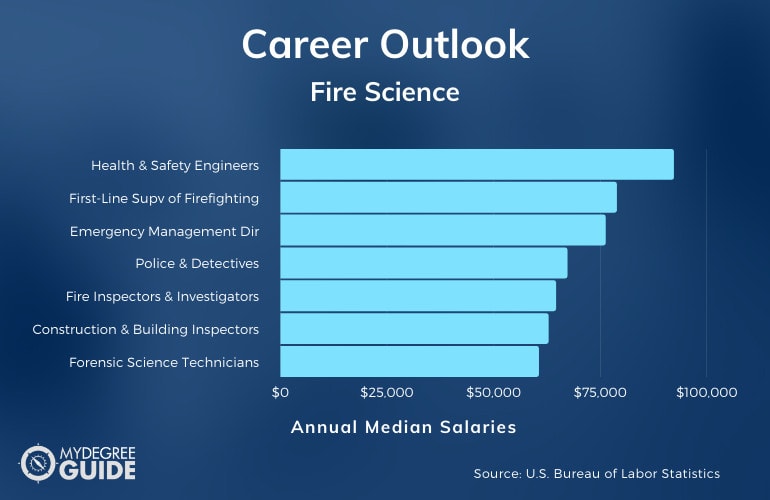
A master’s degree in fire science can lead to a wide variety of career paths, depending on how you choose to focus your education.
Many graduates continue on to become firefighters, fire engineers, or leaders in a fire administration role. There are a number of universities that offer on-campus and online fire administration degree programs. Some also pursue work as first-aid responders, investigators, engineers, or members of law enforcement.
According to the Bureau of Labor Statistics, the following are common jobs related to fire science.
| Careers | Annual Median Salaries |
| Health and Safety Engineers | $94,240 |
| First-Line Supervisors of Firefighting and Prevention Workers | $78,870 |
| Emergency Management Directors | $76,250 |
| Police and Detectives | $67,290 |
| Fire Inspectors and Investigators | $64,610 |
| Construction and Building Inspectors | $62,860 |
| Forensic Science Technicians | $60,590 |
| Firefighters | $52,500 |
| Forest Fire Inspectors and Prevention Specialists | $42,150 |
| EMTs and Paramedics | $36,650 |
The highest median salaries for fire science tend to be in engineering services roles. There is high-paying potential across many of the roles here, though. For example, the highest 10% of firefighters earned more than $93,790 (Bureau of Labor Statistics).
In addition, demand for these fields is accelerating over time. The Bureau of Labor Statistics projects 6% and 8% growth for firefighters and fire inspectors respectively. Notably, forest fire inspectors and prevention specialists are projected to see explosive 24% growth as we continue to look for ways to preserve our natural forests.
Fire Science Master’s Curriculum

You can usually tailor your online masters curriculum toward your career goals. Here’s an overview of some of the courses your program might offer:
- Chemistry and Physics of Fire: You’ll study the combustion process and the organic chemistry and physics at play, including thermodynamics, ignition, and flame spread.
- Fire Scene Investigation: This course takes a close look at crime scene investigation techniques related to fire, arson, and explosions.
- Legal Aspects of Fire Investigation: You’ll learn about the legal world of arson investigations, including legal conduct at crime scenes and prosecution procedures.
- Fire Protection Systems: Designed for aspiring fire protection engineers, this course is a broad overview of fire suppression and detection systems, such as sprinkler systems and alarms.
- Strategic Management: This course teaches numerous management skills for the workplace, including workforce development, conflict resolution, and goal setting.
- Financial Management: Necessary for any fire administration manager, this course teaches how to secure and manage financial resources to meet a fire agency’s needs.
- Hazard Identification and Control: If you’re looking to get into occupational health and safety, this course introduces common hazards, such as noise and electrical hazards, and introduces measures to control them.
- Building Fire Safety: Another key course for occupational technicians, this course focuses on qualitative and quantitative methods to analyze the fire safety of buildings.
- Performance-Based Design: You’ll apply fire protection engineering methods to the design of buildings in conjunction with building officials and fire agencies.
- Issues in Public Safety: This course presents modern day issues relating to public safety, with a focus on ethically developing and maintaining the public trust.
You may want to keep an eye out for any required prerequisites. For example, a course in fire protection systems may require basic knowledge of general engineering principles, mathematics, chemistry, and physics.
Admissions Requirements
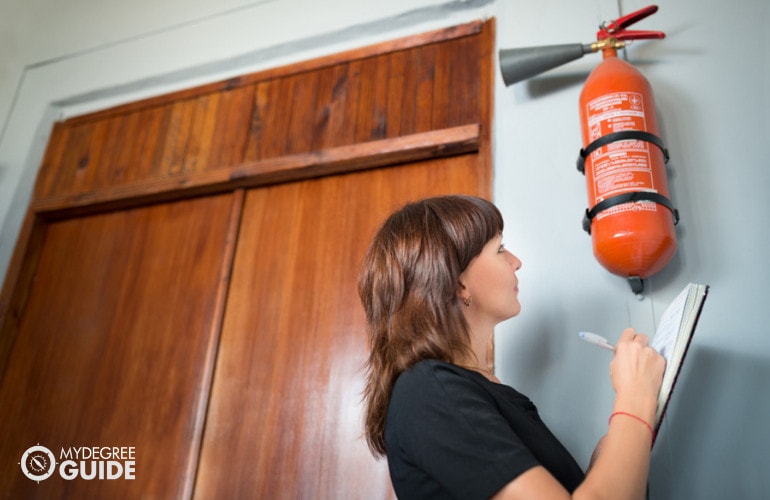
Admission into an online master’s in fire science program may require you to have the following.
- Bachelor’s degree. Most programs require a bachelor’s degree, and certain concentrations may specifically ask for a bachelor’s degree in fire science.
- GRE or GMAT scores. Certain programs waive the GRE or GMAT, so it’s helpful to check with your school.
- Statement of purpose. You’ll most likely need a statement of purpose describing your interest in the program as well as your intended career goals after graduation.
- Recommendation letters. You might also be required to submit recommendation letters about your past professional and academic achievements.
You can check your school’s website and reach out to their admissions office if you have questions about any of their requirements.
Accreditation
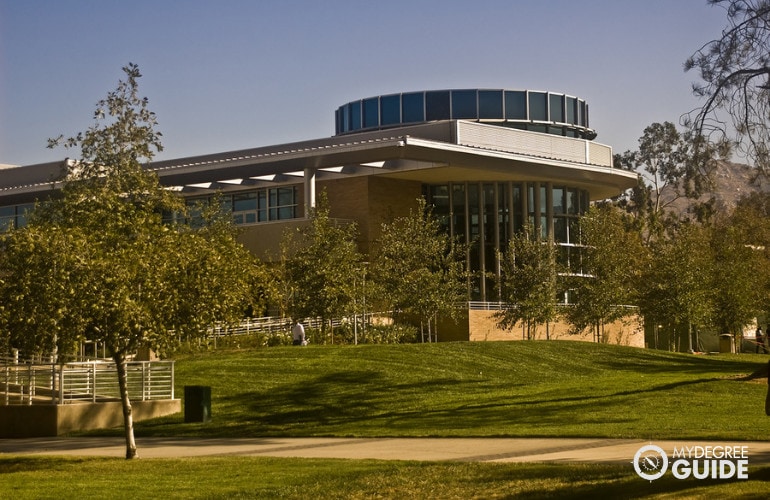
Regional accreditation is a system that helps ensure a certain standard of education among learning institutions.
When picking out prospective programs, it can help to verify that the schools are accredited by a reputable source, such as an organization recognized by the Council for Higher Education Accreditation (CHEA).
Editorial Listing ShortCode:
A school’s accreditation status can also have financial implications. Attending an accredited school is often one of the qualifiers for federal or state financial aid.
Your school’s accreditation status may even affect your career beyond your master’s program. Employers may have preference for candidates who have degrees from accredited institutions. Also, if you choose to take a professional licensing exam, some certification boards only qualify students from accredited schools.
Financial Aid and Scholarships

You may be wondering about the cost of a masters degree in fire science. Luckily, there are multiple financial aid options available for qualifying students.
Before applying straight for student loans, you may try looking for a suitable fellowship. Fellowships offer a way for you to work and get paid while pursuing your studies, and they are often merit-based.
Scholarships are another option you can look into. Scholarships are usually based on merit, field of study, or location, and they are typically offered by professional organizations and nonprofits. If you’re currently employed, you may want to sit down with human resources to discuss whether your company offers tuition reimbursement.
Finally, there may be other work-study or federal and state aid programs that can help pay for school. You can find out your eligibility for various programs by submitting your Free Application for Federal Student Aid (FAFSA), which is largely based on financial need.
Fire Science Professional Organizations

Joining a professional organization can show that you’re committed to your field of study and can open the door to networking opportunities with like-minded individuals.
Besides being able to expand your professional network, you can also gain access to exclusive resources, such as resume critiques and general job search advice. You can also gain insights into the current state of the field if you attend different professional and social events.
What Is Fire Science?

Fire science is the study of the characteristics and behaviors of fire. As the name implies, it uses a scientific approach based on chemistry and physics to explain how fires start and how to put them out.
In practice, fire science also covers important techniques in both fire investigation and fire prevention. This can help prepare you for industries like firefighting, fire prevention engineering, building fire safety evaluation, and crime scene investigations.
Can You Get a Masters in Fire Science?

Even though it’s not the most common offering, many accredited schools do have masters programs in fire science. Generally, a masters degree will help you dive deep into one particular area of fire science, relying on a solid foundation built in a bachelors program.
Career-wise, a masters degree may give you a significant edge if you want to climb the ranks and become a fire chief or take on another senior or leadership role.
What Can You Do with a Masters in Fire Science?
Graduates with a masters in fire science tend to go into industry working as firefighters, engineers, investigators, and other roles in fire protection services. You will be most qualified for roles that relate to your concentration, so you may want to take projected salaries into consideration when choosing your specialty.
Editorial Listing ShortCode:
According to the Bureau of Labor Statistics, health and safety engineers—which include fire prevention and protection engineers—earn some of the highest median wages in the fire science space. A masters degree can often qualify you for a higher starting salary in most positions, though, regardless of what concentration you choose.
How Much Does a Fire Scientist Make?
The median salary range for fire scientists can range greatly. The median salary for forest fire inspectors and prevention specialists is $42,150, and the median salary for health and safety engineers is $94,240 (Bureau of Labor Statistics).
Working as a firefighter is the most common career path for fire science graduates. The Bureau of Labor Statistics shows that firefighters earn a median salary of $52,500 per year. Salaries have the potential to increase over time for candidates with advanced degrees, especially for those who get promoted into senior leadership positions.
How Long Does It Take to Get a Masters in Fire Science Online?

Similar to other online masters programs, if you are a full-time student and follow a traditional 16 week semester, a masters in fire science will likely take 1 to 2 years to complete. Your completion time may be shorter if you have transferable credits, or it may be longer if you pursue the degree part-time.
How long it takes you to finish can also depend on your chosen concentration. Certain programs may be shorter while others can involve capstone projects and a final thesis. Usually, a masters in fire science shouldn’t take longer than 3 years to complete.
A growing number of universities also offer accelerated fire science degree programs.
Is a Masters Degree in Fire Science Worth It?

Yes, a master’s degree in fire science is worth it for many students. The Bureau of Labor Statistics projects 6% job growth for firefighters and 8% job growth for fire inspectors over the next ten years, which is faster than the average growth for all occupations.
Having firefighters be the first responders to fire emergencies will always be necessary for the safety of society. The same goes for engineers and innovators who design the next generation of fire safety systems.
To excel in these fields requires a solid understanding of advanced fire science concepts. With increasing demand projected all-around for firefighters and other fire science specialists, a master’s degree may be a key stepping stone towards a rewarding career.
Universities Offering Online Masters in Fire Science Degree Programs
Methodology: The following school list is in alphabetical order. To be included, a college or university must be regionally accredited and offer degree programs online or in a hybrid format.

Anna Maria College offers an online program for a Master of Public Administration with a specialization in Fire and Emergency Services. The program offers a direct track that gives students the opportunity to finish the program in 12 classes. Applicants must have a GPA of 2.7 or higher, 2 references, a resume, and a personal statement.
Anna Maria College is accredited by the New England Commission of Higher Education.

Arizona State University offers an online program for a Master of Public Safety Leadership and Administration with a specialization in Fire Administration. To graduate, students must complete 11 classes. Each course lasts 7.5 weeks. Applicants must have a GPA of 3.0, a letter of intent, and 2 letters of recommendation.
Arizona State University is accredited by the Higher Learning Commission.
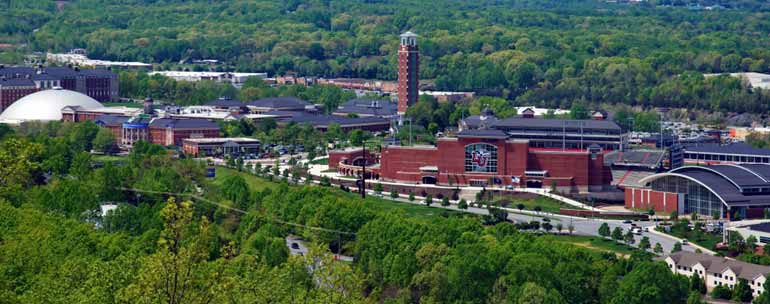
Liberty University offers an online program for a Master of Public Administration with an emphasis on Fire Administration. A total of 36 credits are required to graduate, with the option to transfer in up to 18 qualifying credits. Courses last for 8 weeks. Applicants must submit official transcripts and have a bachelor’s degree.
Liberty University is accredited by the Southern Association of Colleges and Schools Commission on Colleges.

Oklahoma State University offers an online Master of Science in Fire and Emergency Management Administration program. To graduate, students must complete 33 credits. Applicants must have a bachelor’s degree with a GPA of 3.0 and either practical experience in fire or emergency services or a minor or bachelor’s in a related field.
Oklahoma State University is accredited by the Higher Learning Commission.

Saint Leo University offers an online program for a Master’s in Emergency and Disaster Management with an emphasis in Fire Science. The program is designed for students who are already working in the field. A total of 36 credits are needed to graduate. Applicants must have a GPA of 3.0 or higher and a statement of professional goals.
Saint Leo University is accredited by the Southern Association of Colleges and Schools Commission on Colleges.
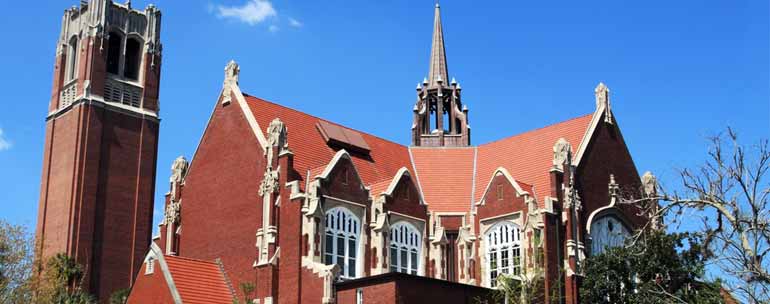
The University of Florida offers an online Master of Fire and Emergency Sciences program. To graduate, students must complete 11 courses to obtain 33 credits. Applicants must submit transcripts, a resume, a statement of purpose, and 3 letters of reference and have a minimum GPA of 3.0 from their bachelor’s degree.
The University of Florida is accredited by the Southern Association of Colleges and Schools Commission on Colleges.

The University of Idaho offers an online program for a Masters of Natural Resources with a certificate in Fire Ecology, Management, and Technology. Students must complete 50 credits to graduate—35 credits for the master’s degree and 15 for the certificate. Applicants must have a GPA of 3.0 or higher and 3 letters of recommendation.
The University of Idaho is accredited by the Northwest Commission on Colleges and Universities.

The University of Maryland offers an online Master of Engineering in Fire Protection program. The program can usually be completed in 15 months and requires 30 credits to graduate.
Students do not have to complete a thesis to graduate. To be eligible, applicants must have a Bachelor of Engineering with a GPA of 3.0 and must complete 4 prerequisite courses.
The University of Maryland is accredited by the Middle States Commission on Higher Education.

Waldorf University offers an online program for a Master of Arts in Organizational Leadership with a concentration in Fire Rescue Executive Leadership. To graduate, a total of 36 credits with a GPA of 3.0 or higher are needed. Applicants must have a bachelor’s degree with a GPA of 2.5 or higher.
Waldorf University is accredited by the Higher Learning Commission.

Worcester Polytechnic Institute offers an online Master’s in Fire Protection Engineering program.
A total of 30 credit hours are needed to graduate, with 6 courses open for electives. There is no thesis option available. Applicants must have taken courses in heat transfer, fluid mechanics, thermodynamics, and calculus to be considered.
WPI is accredited by the New England Commission of Higher Education.
Getting Your Masters in Fire Science Online

If you’re passionate about protecting the world from the devastating effects of fire, you may want to consider earning a masters degree in fire science online. You can even pick a concentration that dives into the aspects of fire science you enjoy most.
Professionals in the field tend to serve on the front lines against fire, either directly as a firefighter or leader or indirectly as an engineer or fire safety inspector. If you’re ready to develop expertise and advance in this rewarding field, you can get started today by exploring accredited online masters programs in fire science.

